Over the years, I’ve spoken with many hospitality professionals who agree: a hotel is more than just a place to stay. It’s a brand, an experience, and a haven that evokes emotions in its guests.
Hospitality brands excel at creating memorable experiences that foster loyalty and repeat visits. While some trends, like virtual reality, have fizzled out, innovations like mobile technology have revolutionized the industry.
As we move towards a more digitalized society, hospitality remains a balance of tech innovation for efficiency and human connection for authentic experiences. With robust growth projected in sectors like bleisure and wellness, the hospitality industry is poised for significant transformation in 2026.
This sets the stage for discussing emerging trends driven by technology, evolving consumer preferences, and sustainability, a formula for enhancing guest experiences and ensuring long-term success through the use of essential business tools.
Why do we care about hospitality trends?
Most hospitality trends that make a difference to operators are more subtle and harder to spot. I’ve learned to largely ignore big, buzzy trends as they rarely change anyone’s behavior (or make anyone more money).
But trends, particularly technology trends, are important for hospitality operators to keep track of because, as trends change, companies need to evolve to remain competitive and attractive to potential guests. This evolution is crucial for enhancing business operations, as it can streamline marketing strategies, improve customer engagement, and increase operational efficiency.
With marketing, keeping up with the latest trends will give you the best possible chance of reaching your target audience - and doing it a lot faster. Trends need to be understood for what they are - ideas you can use, ignore, and develop.
Following a trend is useful until you start alienating the original. The last thing we want is to live in a world where everything is the same. Originality and individuality are key.
Many times I’ve heard stories of brands or operators investing six figures into some new technology only to realize a year later it was a complete waste of money - don’t let that be you!
My advice - follow trends but be critical and use them creatively.
With that said, I’ve compiled a list of the best trends in the hospitality and restaurant industry right now. I’ve spoken to experts on restaurant technology in Eat App like Joseph Boston and Nezar Kadhem, as well as learned from marketing and operations experts like Dawn Gribbles, Michael “Schatzy” Schatzberg, and Shawn Walchef.
These are the best hotel and hospitality trends that are aimed at efficiency, enhancing the guest experience, and boosting revenue.
Rich guest data and personalization
Personalization driven by rich guest data is a trend that’s been happening in the industry for a least the past five years, and I don’t see it slowing down anytime soon. In fact, the opposite.
Hoteliers cannot afford to give up, though, and must stay relevant.
Leveraging customer data and technology to initiate customized offerings and personalization could help make them more relevant.
However, when some industry experts advocate personalization, somehow the suggested solutions tend to be more related to selling upgrades or improving their e-mail marketing, precisely the kinds of activities that do not contribute to relevance.
It’s not about trying to upsell guests with add-ons; it’s about providing a memorable experience that drives loyalty and customer satisfaction.
Examples include asking returning hotel guests if you’d like to book them an experience they liked last time, or reserving a particular spot, lounger, etc, they enjoyed last time. This is ultimately the holy grail of personalization and data.
According to research from McKinsey Consulting, 71% of buyers expect personalized experiences, and to get there, hospitality businesses require two things: customer relationship management (CRM) software to keep track of the data, and staff training to make sure they are collecting the information that matters to personalized interactions and marketing.
Dynamic pricing
Dynamic pricing is the practice of changing pricing depending on the demand for what you sell, often utilizing revenue management tools to optimize pricing and manage demand.
There’s some great insight from Jordan Hollander, CEO of Hotel Tech Report, about dynamic pricing, its potential impact on RevPar, and how to implement it here.
Dynamic pricing is also a trend becoming more common in restaurants. Here, for example, hospitality influencer Shwan Walchef discusses dynamic pricing with a tool called Juicer
All hospitality businesses that run F&B will look into this type of approach more, especially when the pricing is dynamically changing with low friction for the end user.
New loyalty marketplaces
Loyalty in the hospitality industry is usually about locking in the customer to a single brand with points, bonuses, and exclusives - especially at Hotels. Name me one hotel brand that doesn’t have a loyalty program?
But in other parts of the hospitality industry, the landscape is less clear. Restaurant loyalty programs tend not to be that effective.
There are probably hundreds of loyalty app companies for restaurants that have gone out of business in the last 10 years. This is mainly because outside of lunch spots in big cities, we just don’t eat at the same restaurant all that often.
There are some new ideas coming to the loyalty world, and I would bet on them becoming a trend in the coming years.
.webp?width=500&height=255&name=Screenshot%202023-10-19%20at%2012.52.33%20PM%20(1).webp)
One is decentralized loyalty, like Blackbird. A company started by industry heavyweight Ben Leventhal, which he describes as:
Blackbird will be the first decentralized platform built especially for the hospitality industry. Unlike legacy rewards marketplaces, which maroon and lock earned points, the Blackbird protocol will eventually allow users to take the points they earn anywhere they go on public blockchains.
It's a seamless way to earn credit you can use at multiple restaurants, enabled by Blockchain. This approach can be integrated into broader digital marketing strategies, enhancing customer engagement and brand reputation through innovative loyalty solutions.
Sustainability
Increasingly, customers are concerned with environmental issues and want to know that the businesses they deal with are behaving ethically.
For this reason, sustainability has been one of the most noticeable hospitality marketing trends of recent times, with a growing number of hospitality businesses promoting their eco-friendliness.
Examples of this range from restaurants promoting their vegetarian and vegan options to hotels that use smart light bulbs and smart heating to save energy, leading to significant cost savings.
Within the accommodation sector, there are also decisions to be made about using more sustainable materials for things like towels and bedsheets. You can see this trend really developing with industry leader Radisson’s goal of standardizing sustainability in hotels.
Further reading
Will AI be a hospitality trend?
There plenty of ways AI could speed up work in the future for hotels and restaurants in all aspects from planning to marketing but the impact is likely to be marginal.
We've written about Chat GPT and AI in hospitality before at Eat App. I think it will have some impact as a trend but probably much smaller than a lot of people are predicting - especially when it comes to guest experience.
Hospitality industry trend 2026 survey
What is the future of hospitality in the short term? We surveyed hospitality leaders at Eat App with a combined 100+ years experience of in building technology for the hospitality industry.
Overall, our experts suggest the following advice for the industry:
1. Personalization is a major focus
Learning how to implement proper personalization and marketing strategies, is direction the industry is moving in - and customers are expecting it.
2. Training, training, training
Joseph Boston, VP of product at Eat App works with hundreds of operators and front-line staff every quarter.
He suggests that "training is crucial for success. In a business with high staff turn over the ability to train fast and effectively is a key differentiators between OK and runaway success."
3. Deploy technology to improve efficiency
The hotel experience will be deeply intertwined with technology, not only within the confines of guest rooms but also before and after the journey. As a result businesses must consider technology at every touchpoint.
4. Air BnB will decline, hotels will rise
A respondent said that“hospitality operators should quickly try and capitalize on the decline of Air BnB - a service which is now expensive and underwhelming. Differentiating on experience can be the key driver here."
5. Sustainability
Sustainability is a major trend in all industries, and the hospitality industry is no exception. Hotels and resorts are increasingly looking for ways to reduce their environmental impact, through sustainable practices such as using renewable energy, sourcing local food, and reducing waste. It's all about attracting guests!
Smaller trends in hospitality
I've noticed a few more trends over the past year and expect these to continue.
6. Localized guest services
Hoteliers can use location-based services to create personalized, localized experiences that are the hallmark of modern travel.

7. Mobile-enabled check-ins
The use of mobile check-in and contactless check-in has many benefits for both hotels and their visitors. The availability of mobile check-in via the hotel app does away with the need to maintain a large reception desk.
While staff members are free to handle other tasks, hotels can free up space for luggage storage, common areas, and branded merchandise counters.
With mobile check-in, guests won’t have to wait in line at the front desk, which can be essential for business travelers and families with young children.
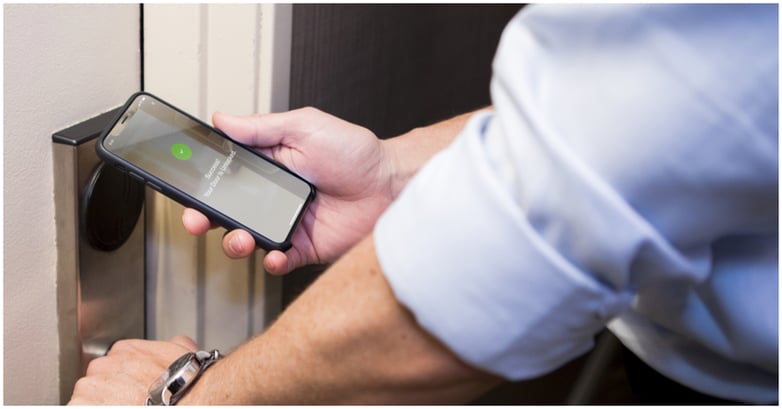
8. Automated guest messaging
Using the right integrated management system at your hotel can enable automatic guest messaging campaigns or allow you to export rich guest data to be used for external marketing.
9. Contactless payments
Contactless payments are one of the most popular technological trends in the hospitality sector because they have many benefits for hotels, resorts, restaurants, bars, and cafes.
10. Cloud PMS
The cloud hotel property management system (PMS) is a piece of software that includes various modules and features to automate every aspect of your hotel’s operations. I expect it to become more and more common.
Note: If you use the right restaurant management software at your hotel properties, your PMS can be integrated to give rich insight into every one of your diners at a glance.
11. Tech enabled revenue management
The foundation of a hotel’s pricing strategy is a revenue management system that leverages analytical tools. The sophistication of these systems will only increase and enable fine tuned pricing and optimization for small hotels as well as large brands.
12. Chatbots
Driving direct bookings is just one of the many uses that chatbots can be put to. Customer service is likely to be disrupted in some capacity AI and ChatGPT style chatbots but I'm skeptical it will revolutionize hotel customer service.
13. Smart energy management
Occupancy changes can be tracked and handled by smart thermostats and occupancy sensors.
The same goes for smart energy management systems, which continuously analyze historical thermodynamics, regional weather patterns, and peak demand loads to optimize energy consumption in real-time, all year long.
14. Co-working spaces
A lot of hotels are building some kind of co-working option beyond a cafe into their hotels to optimize business processes.
The NEST by Wyndham is a great example of this. It encourages engagement with the brand, adds an extra source of revenue for example by cross selling the Spa to the Co-working space subscribers.
.webp?width=407&height=271&name=download%20(1).webp)
I predict we will see a lot more of this but success will depend a lot on location.
15. Predictive property analytics
As the saying goes, information is power, and an analytical tool is essential for harnessing this power. The software and devices will generate more and more data about how visitors interact with staff and amenities across the campus as more technology is added to enhance the guest experience.
16. Robots
I don’t expect robots to have a massive impact in areas like check-in or carrying bags like some are predicting, but I do think a huge trend will be robots in F&B and restaurants, particularly in task management.
The technology here makes much more sense where the actual cooking and preparation of food is not a customer facing part of a hospitality business.
17. Booking on mobile devices
Would you be able to survive without your smartphone if you had to make a last-minute hotel reservation in a strange and foreign location?
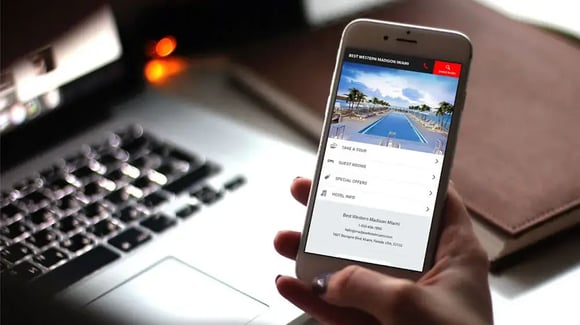
Smartphones have significantly influenced how people interact with the outside world, providing easy access to booking options and information. In many situations, their popularity surpasses that of desktop computers due to their simplicity and convenience.
18. Virtual reality
It can be challenging for prospective guests to picture their upcoming vacation rental before they depart.
How can owners of boutique hotels in Santorini effectively convey to prospective customers the carefully curated charm of their establishment?
Virtual reality (VR) technology allows businesses to give prospective customers first-person digital tours of their space.
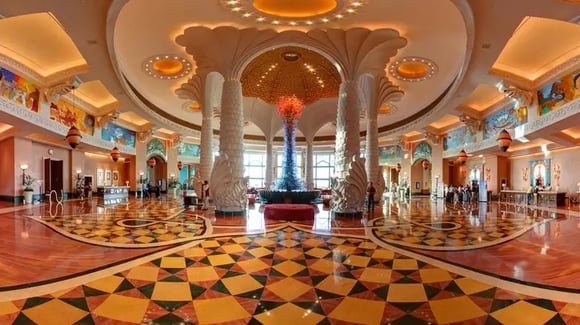
In order to highlight the hotel’s key features, Atlantis Dubai for example offers a virtual tour. The advantage: VR encourages potential travelers to daydream about experiencing amenities before they travel.
A Tourism Management study by Sage found that VR enhances the brand experience by increasing the elaboration of mental imagery and presence in comparison to other virtual tours.
VR is a definitely a trend - but will it be revolutionary? In my experience I have my doubts.
19. Predictive maintenance
Predictive maintenance enables hoteliers to use sensor data to identify wasteful or hazardous trends, enhancing service delivery by alerting maintenance staff before a specific issue escalates into a much more expensive one.
20. Smart reserved parking
Nowadays, hotels can use sophisticated sensors and hotel-specific apps to enhance operational efficiency by letting visitors reserve parking spaces in advance and have those spaces assigned to them when they arrive.
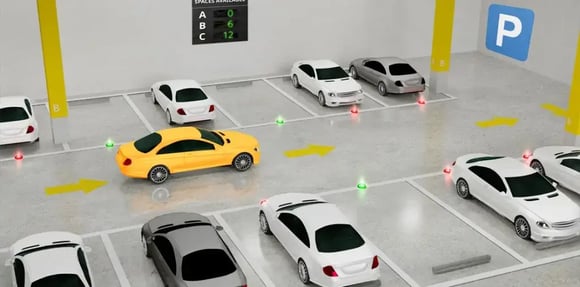
21. Online review management
Online reviews of a hotel not only aid in forecasting future reservations, but also give owners important information about how well a facility met visitors’ expectations across various distribution channels.
Further reading
22. Gamified travel planning
The world is more desperate than ever for spontaneity because cabin fever is at an all-time high.
In order to make travel planning less of a chore and more of a guilty pleasure as people think about their next getaway, hospitality companies can use gamification, which involves incorporating game design elements into non-game contexts.
23. Hotel operations and management
Hotel operations and management are the backbone of any successful hospitality business. From front desk operations to housekeeping and maintenance, every aspect needs to run smoothly to ensure guest satisfaction. Property management systems (PMS) play a crucial role in this, helping manage room inventory, reservations, and guest information efficiently. These systems streamline processes, allowing staff to focus on providing exceptional service.
Revenue management systems (RMS) are equally important, enabling hotels to optimize pricing and maximize revenue. By analyzing market data and adjusting prices based on demand, hotels can ensure they are always competitive. Business intelligence tools further enhance this process by providing insights into market trends and guest preferences, allowing for informed decision-making.
Effective hotel operations and management require attention to detail, strong communication skills, and the ability to multitask. When done right, they lead to increased guest satisfaction, improved service quality, and higher revenue. Online reputation management tools are also essential, helping hotels monitor and manage online reviews, which can significantly impact their social media presence and overall reputation.
24. Marketing and sales strategies
In the competitive hospitality industry, effective marketing and sales strategies are vital for attracting and retaining customers. Social media tools are invaluable for creating personalized marketing campaigns and engaging with potential guests. By leveraging platforms like Instagram and Facebook, hotels can showcase their unique offerings and build a loyal following.
Email tracking tools, such as Streak Email Tracking, help hotels track and respond to guest inquiries and bookings promptly. This ensures that no potential guest is overlooked and that communication remains seamless. Data analytics also play an important role, allowing hotels to analyze guest feedback and preferences, and tailor their marketing efforts accordingly.
Online travel aggregators (OTAs) are another powerful tool, helping hotels increase their online presence and reach a wider audience. Channel management tools further enhance this by managing distribution strategies and maximizing revenue. Effective marketing and sales strategies not only lead to increased direct bookings but also reduce costs and improve revenue optimization, making them indispensable for any hospitality establishment.
25. Guest safety and security
Guest safety and security are paramount in the hospitality industry. Hotels can use various tools and technologies to ensure a safe and secure environment for their guests. Property management systems (PMS) help manage guest information and ensure that only authorized personnel have access to guest rooms, enhancing security.
Revenue management systems (RMS) not only optimize pricing and maximize revenue but also ensure that guests are aware of any security measures in place. Data analytics can be used to analyze guest behavior and identify potential security risks, allowing hotels to take proactive measures.
Social media tools are also valuable for communicating with guests and providing them with important safety and security information. Email tracking tools, such as HubSpot CRM, help track and respond to guest inquiries and concerns promptly, ensuring that guests feel heard and valued.
Effective guest safety and security measures lead to increased guest satisfaction, improved reputation, and reduced liability. By prioritizing safety, hotels can build trust with their guests and ensure a positive experience for all.
Conclusion
In conclusion, hospitality technology is a rapidly growing and evolving field that encompasses a wide range of technologies and tools used by the hospitality industry to enhance the guest experience, streamline operations, and improve efficiency.
Some of the key trends in this field include the increasing use of AI restaurant software and machine learning, mobile technology, VR and AR, and data analytics and reporting tools.
However, it is important for hotels to strike a balance between the use of technology and the personal interactions that guests expect.
Frequently asked questions about trends in hospitality industry
What are 3 major trends in today's hotel industry?
1. Rich guest data and personalization: According to research from McKinsey Consulting, 71% of buyers expect personalized experiences and to get there hospitality businesses require two things - CRM software to keep track of the data, and staff training to make sure you are collecting the information that really matters to personalized interactions and marketing.
2. Dynamic pricing: Dynamic pricing is the practice of changing pricing depending on the demand for what you sell.
3. Artificial intelligence: There plenty of ways AI could speed up work in the future for hotels and restaurants in all aspects from planning to marketing.
What is the future of hospitality in 2024?
The hotels are expected to adopt green technologies to become more environmentally friendly in the coming years. Another initiative is installing LED lighting, using recyclable material and energy-efficient appliances.
How is technology used in the hospitality industry?
Cloud technology is a common technology used by hospitality industry professionals and includes Cloud computing functions. Payment via mobile phone. Payment by phone. Contactless booking in/out.
Is technology the future of hospitality?
Future of hospitality focuses on enhancing guest services and personal experience while improving business models. Technology will continue routine operations, allowing employees to offer personalized services they could not commit to.
What is digital technology in hospitality industry?
Digital adoption in hospitality consists of the implementation and use of different digital solutions, such as online reservation systems, digital menus, contactless payment and hotel management tools.














.webp?width=200&name=v2-15mknc-qpw1b%20(1).webp)
.webp?width=200&name=v2-15kqni-p0exl%20(1).webp)
-1.png?width=1812&height=1072&name=TripAdvisor%20%26%20More%20Bookings%20(1)-1.png)
-2.png?width=1812&height=1072&name=Google%20Bookings%20(1)-2.png)


-1.png?width=200&name=TripAdvisor%20%26%20More%20Bookings%20(1)-1.png)
-2.png?width=200&name=Google%20Bookings%20(1)-2.png)
-1.png?width=200&name=Instagram%20Bookings%20(1)-1.png)
-1-png.webp?width=200&name=Facebook%20Integration%20Rectangle%20(1)-1-png.webp)







.webp?width=200&name=download%20(1).webp)
%20(1)-2.webp?width=200&name=Eat%20(34)%20(1)-2.webp)
%20(1)-2.webp?width=200&name=Eat%20(18)%20(1)-2.webp)




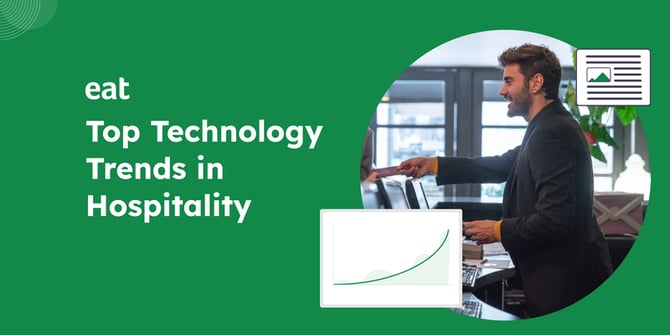





.webp?width=144&height=72&name=Eat%20App%20Logo%20(3).webp)